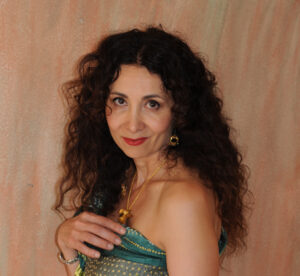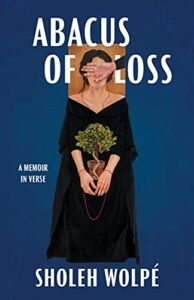The PEN Ten: An Interview with Sholeh Wolpé
The PEN Ten is PEN America’s weekly interview series. This week, PEN America’s Los Angeles Literary Programs Intern Ben Cohn speaks with Sholeh Wolpé, author of Abacus of Loss: A Memoir in Verse (Univ. of Arkansas Press). Amazon, Bookshop.

1. What is your favorite bookstore, or library?
My favorite bookstore is a kiosk in the Iranian National Oil Company Resort by the Caspian sea. We used to stay there all summer long, every year from when I was 6 years old up until when I was sent to Trinidad at age 13. I spent all my weekly allowance buying books from that kiosk. The resort, as it existed, was destroyed when Iran fell under the tyrannical rule of the Islamic Republic (no more bikini-clad ladies, no more evening concerts, outdoor movies, or men and women dancing together by the sea.) Yet, that beloved kiosk still stands unscathed in my memory, crammed with paperback books and magazines, redolent with the vanilla-smell of paper mixed with the humid aroma of the salty sea. The mustached vendor appreciated my voracious appetite for books. If my meager budget didn’t fully pay for a book, he let me have it anyway and collected it on the sly from my father when he bought his daily newspaper.
2. What’s a part of Abacus of Loss that came as a challenge to write?
All of it. It was difficult to open myself up to the world. To lay bare my deepest desires, traumas, shames, and dreams. And further, to do that without denigrating others, announcing grudges, or laying blame on this person, that family member, or fate, for my own shortcomings and disappointments. I tried not to do that. Instead, I told my life story in a way that invites you, the reader, to see our commonality and take the journey with me as a fellow traveler through life.
“The movement of the story does not conform to the common chart of space and time because memory does not conform to such strictures. Therefore, this memoir’s carefully arranged form allows you, the reader, to step into a landscape that is at once sharp and fuzzy, concrete and abstract, here and not here, mine but also yours.”
3. How did you come to the symbol of the abacus?
Abacus is an instrument of remembering. You slide the beads up and down the rods to add or subtract, to total and compile. Each section in this memoir is a rod, and each memory, a bead.
4. Abacus of Loss is structured in sections, which are then broken down into “beads.” As the sections go on, these beads are strung together, evoking jewelry. Why call each of these poems “beads,” and how does naming them “beads” change how the reader interacts with the work?
Every bead in Abacus of Loss advances the story of my nomadic life— counting losses and gains as I guide the reader deeper and deeper into my life, memory by memory. The prose tells my story in a concert manner; the poetry opens up a space for you to join the journey, and ultimately to make it yours as well.
5. Why did you decide to write a memoir in verse? What can verse accomplish in a memoir that prose cannot?
I wanted to tell my story the way I experienced it, and I wanted to draw the reader into that experience. So I created a form that suited my vision. Let me explain. The movement of the story does not conform to the common chart of space and time because memory does not conform to such strictures. Therefore, this memoir’s carefully arranged form allows you, the reader, to step into a landscape that is at once sharp and fuzzy, concrete and abstract, here and not here, mine but also yours. In the end, like the sum of any life in nuggets of memory, everything comes to focus, and despite the loss and sadness, exile and displacement, love and betrayals, we find ourselves not in despondent darkness but a light-filled, hopeful place I call gratitude.
“What keeps me inspired is the freedom to move fearlessly across art forms and genres. I’m the total sum of what I want to be: a poet, a playwright, a librettist, and a literary translator.”
6. A recurring motif in Abacus of Loss is pistachios. They’re shared between lovers as well as between parents and children. Why did you return to pistachios so often? Is there something intimate in the cracking open of a nut, revealing what is hidden by the shell?
 That makes me laugh. Yes, you are right. But life is like a pistachio, isn’t it? Hard and soft at the same time. Inviting yet reserved. Seemingly difficult to split, yet once you crack it open you’re rewarded with a soft fleshy secret. If I could rewrite the story of Eve, she wouldn’t bite into an apple. She’d crack open a pistachio nut.
That makes me laugh. Yes, you are right. But life is like a pistachio, isn’t it? Hard and soft at the same time. Inviting yet reserved. Seemingly difficult to split, yet once you crack it open you’re rewarded with a soft fleshy secret. If I could rewrite the story of Eve, she wouldn’t bite into an apple. She’d crack open a pistachio nut.
7. When did you realize that you wanted to be a writer? What and who influenced you?
Confession: I was a terrible student in Iran. Except for literature, of course. I simply didn’t see the world the way they said I should. For example, I didn’t like memorizing historical events without knowing the intricate details of whys and hows of what happened. I wanted the stories. Instead, I was offered “facts” and “dates.” It exasperated my teachers. Too often they dispatched me to the principal’s office. They said I was a troublesome kid. But the truth was that I was a curious child who liked to create worlds in her head. I wrote plays and talked my little cousins into performing them on lazy summer afternoons when my extended family gathered for lunch.
Every year, my dad sent me to a week-long summer camp situated in the Alborz mountains. Such happy times. One year, I wrote and directed most of the evening entertainment programs. I was 12 years old. I never said to myself: I am a writer. I simply was.
My favorite poet was Forugh Farrokhzad. But her poems were forbidden to me. “Not appropriate for a young girl,” said my father. As if that stopped me! I stole a paperback collection from my aunt’s bookshelf, hid it under my mattress and read her poems with a flashlight. Today, that book is my sole surviving possession from Iran. (Sorry Aunt, if you want it back … well, you’d have to catch me first.) At the time, if someone had told me I’d grow up to translate Forugh Farrokhzad and win an award for it, I would have laughed my a#% off. The book: Sin—Selected Poems of Forugh Farrokhzad (University of Arkansas Press.)
8. What does your creative process look like? How do you maintain momentum and remain inspired?
What keeps me inspired is the freedom to move fearlessly across art forms and genres. I’m the total sum of what I want to be: a poet, a playwright, a librettist, and a literary translator. In Song of Myself, Walt Whitman writes: “I am large, I contain multitudes.” That’s how I bloody feel all the time when it comes to my art. I’m not afraid to experiment. I am not afraid to fail. And I express that clear as glass in Abacus of Loss:
“Loss is a language / we all speak well, / a body moan that echoes / between ribs, the downfall / that becomes windfall.”
“This is how creativity advances us, step by arduous step—not just up or down, sideways, forward or backward, but also dance-bouncing across time.”
9. In addition to writing your own poetry, you’ve translated four books of poetry. Does translation play a role in your writing practice? How has it informed your poetry?
Literature bridges the gap between cultures. So for me, first and foremost, translation is service.
As a poet, when you translate, you must cut into the marrow of a literary text and consider all the possibilities for its re-creation into another language and culture. How can that not help you become a better writer? A keener observer? A finer wordsmith?
I recently translated The Conference of the Birds (W.W. Norton) by 12th century Iranian Sufi mystic poet, Attar. The epic poem is a soul-changing masterpiece. It is a masnavi, a poetic form invented by the Persians, and consists of a total of 4,724 couplets. I don’t believe it is possible to transfer thousands of rhyming couplets in twelfth-century Persian into formal rhyming verse in English without sacrificing the magic of the original work. Therefore, I spent 3 years re-creating Attar’s epic poem into an accessible, poetic form. That construction later informed the structure I created for Abacus of Loss. This is how creativity advances us, step by arduous step—not just up or down, sideways, forward or backward, but also dance-bouncing across time.
10. How can writers affect resistance movements?
“Here come the octopi of war / tentacles wielding guns, missiles / holy books and colorful flags. / Don’t fill your pens with their ink. / Write with your fingernails, scratch / light upon these darkened days.”
Sholeh Wolpé was born in Iran and lived in Trinidad and the UK before settling in the US. Her most recent book, Abacus of Loss: A Memoir in Verse (Univ. of Arkansas Press) is hailed by Ilya Kaminsky as a book “that created its own genre—a thrill of lyric combined with the narrative spell.” Her literary work numbers over more than a dozen books, several plays, and an oratorio/opera. Sholeh is currently a writer-in-residence at UCI. She divides her time between Los Angeles and Barcelona. For more information about her work visit her website.






